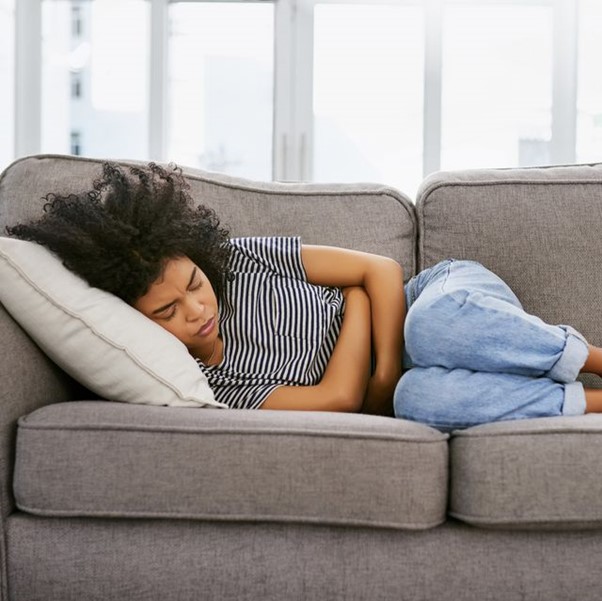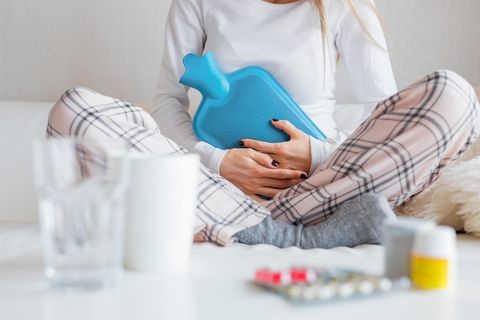
Period symptoms vary from woman to woman, but cramps are a classic harbinger of that special monthly time. While some luckier ladies might just feel an achiness or slight tension in their backs or abdomen at the onset of their periods, other women can get menstrual cramps so bad their lives are disrupted by the pain.
“Menstrual cramps closer to the time of your bleeding, and during, is because of a rise in a hormone-like chemical called prostaglandins,” says Ja Hyun Shin, MD, an assistant professor at the Department of Women’s Health and Obstetrics & Gynecology at Albert Einstein College of Medicine and the director of the Pelvic Pain Clinic at Montefiore Health System in Bronx, New York. “This substance causes a contraction type of pain because it is doing exactly that – helping to contract and squeeze out your uterine lining which is your menstrual bleeding.”
Since your uterus is essentially one large, pear-shaped muscle, those pangs can radiate through the entire lower back and belly area, explains Sherry A. Ross, MD, a women’s health expert in Santa Monica, California, and the author of She-ology: The Definitive Guide to Women’s Intimate Health. Period.
“Cramps tend to be more intense during the first day or two of the period and are a normal part of the period cycle,” Ross says. These cramps shouldn’t be so severe that they impact your daily habits or your quality of life, both experts agree. If they do verge on the debilitating side — and the seven at-home fixes below don’t help — explain your symptoms to your doctor. This could be a sign of something larger such as endometriosis, adenomyosis, fibroids, or infection.

1. Pop an Anti-inflammatory

NSAIDs (non-steroidal anti-inflammatory drugs), which you can find by the names Aleve, Motrin, Advil, Tylenol, or Ibuprofen, should help with the discomfort.
“These work great for period cramps,” Ross says. “The feeling of pain is caused by increased levels of prostaglandins, which make the uterus contract. NSAIDs block the action of prostaglandins and decrease the pain brought on by period cramps.”
2. Exercise

Moderate aerobic exercise is proven to help alleviate period pain, according to research published in the Journal of Education and Health Promotion. It’s beneficial to get your blood circulating with light exercises, such as yoga or a brisk walk, Shin suggests.
“Exercise helps relieve cramps in a number of ways. It stimulates feel-good endorphins, builds tolerance to pain and discomfort, and reduces stress,” Ross says.
3. Stay Hydrated

Drink plenty of H2O and cut back on alcohol and caffeine, Shin adds, which can dehydrate your cells.
“Drinking warm water helps relax the uterine muscles,” Ross says. “Adding ginger to hot water is another useful remedy.”
Incorporating water-rich foods to your menu can’t hurt, either. Try fresh produce such as berries, celery, cucumbers, eggplant, lettuce, oranges, watermelon, or zucchini.
4. Skip Certain Foods

Items high in sodium, dairy, caffeine, fat, and processed ingredients can make cramps worse, Ross advises.
“Avoid these at all costs if you suffer from bad period cramps! Instead, try to integrate more flaxseeds, cinnamon, fiber, and parsley,” Ross says, which may help ease aches.
“Skip things that you notice exacerbate your symptoms. Since bloating is common during your menses, abstain from foods that can make you feel even more bloated,” Shin suggests, such as carbonated drinks and artificial sweeteners.
5. Consume More Calcium

“Calcium-rich foods and supplements reduce muscles from cramping, but when consumed in large quantities can have a negative effect. Ideally, aim for 1,000 milligrams per day of calcium,” Ross says.
Ask your doctor if a supplement might be beneficial, or add these calcium sources to your diet (as long as they don’t exacerbate symptoms): milk, cheese, Greek yogurt, kale, almonds, spinach, soybeans, and figs.
6. Apply a Heating Pad

“Heating pads on the abdomen and warm baths can be soothing—just make sure they’re not too hot!” Shin says.
Ross seconds the advice, adding that remedies your grandma may have suggested can be soothing, like a hot water bottle if you don’t own a heating pad.
If cramps are impacting your sleep routine, a warm weighted blanket may be beneficial, too.

